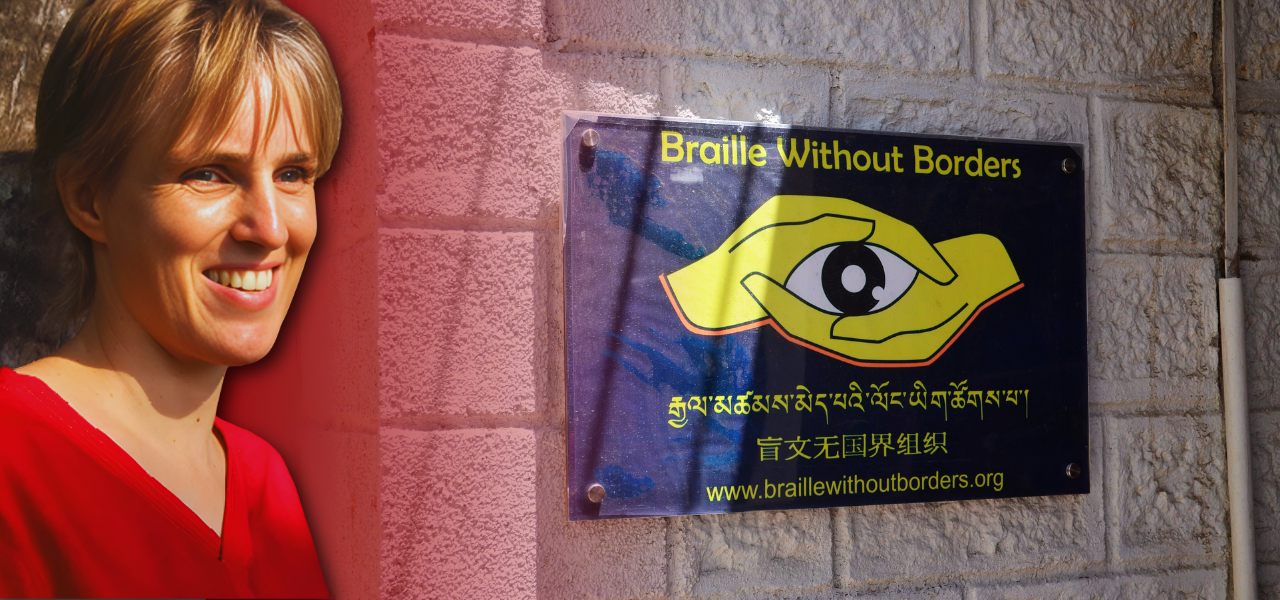Sabriye Tenberken, or Discovering the Light
Parents and Fears
Children don’t understand their parents’ fear. When they ride a bike, climb onto rooftops, or head out to the skating rink, they believe nothing can happen to them. Parents, after all, are supposed to worry — it’s part of their role. But parental fear isn’t random; it’s often justified. A child’s — and especially a teenager’s — sense of invincibility knows no bounds.
Most likely, Sabriye Tenberken, a schoolgirl from Cologne, wasn’t thinking about that either when she went to the skating rink. But it was there that an injury occurred — one whose consequences would change her life. Sabriye began to lose her sight slowly but steadily. Her world first dimmed, then plunged into complete darkness. Her parents, confused and heartbroken, did everything they could for their daughter.
They didn’t give up and did everything they could. Her parents made sure she saw the world before losing her sight completely. They secured her admission to the German School for the Blind in Marburg — a respected institution founded during World War I. After finishing school, Sabriye enrolled at university.
Sabriye enrolled at the University of Bonn (the Rheinische Friedrich-Wilhelms-Universität) in the Faculty of Philosophy, where one of her areas of specialization was Tibetology. By then, Sabriye had understood that the phrase “Black color is beautiful” resonated deeply with her feelings and beliefs. Having personally experienced the discrimination faced by blind people, she decided to do something that would help those whose access to vision and education was far more limited than her own.
As people in the 19th century would say, she turned her gaze to the East — to Tibet. But how do most of us imagine Tibet?
Geographically, Tibet is a vast region in the heart of Asia, about which little is known even today, and much of what we do know is wrapped in myths. For most people, Tibet is a mysterious highland land and the center of Buddhism. The capital, Lhasa, is home to the Dalai Lama’s residence. People live in the mountains under harsh, almost primitive conditions. They speak a language that is nearly impossible for the “golden billion” to understand. Modern history tells us that Tibet was conquered by China, which tightly controls the country and its social life.
Turning East

Working in Tibet has always been difficult: suspicion from the authorities, distrust from the local population, prejudices, and superstitions. Disability discrimination was especially severe regarding the social isolation of the blind, who were sometimes treated harshly even by their own parents. Sabria Tenberken’s achievement is all the more remarkable because she firmly believed that a free Tibet was impossible without access to education for everyone, especially for blind and visually impaired children. In 1998, she moved to Lhasa and, step by step, overcoming government suspicion and social myths, she not only provided blind children with the opportunity to receive an education but also ensured it was delivered in a language familiar to them.
By the time Sabria Tenberken finished school, she had lost her sight completely. Choosing the philosophy faculty at the University of Bonn for her further studies was not surprising. Despite its controversial reputation, the University of Bonn provided its students with an excellent and well-rounded education. What was unexpected, however, was that Sabria wanted to study not only philosophy and sociology but also Tibetology. Naturally, one might wonder why a young woman from Germany, who had lost her sight completely, chose to study the life of a country where even the sighted face many hardships. Why did she choose Tibet, with its high-altitude climate and extremely harsh living conditions, not to mention the lack of familiar comforts? What could connect a young blind woman from Germany with this remote mountainous region?
Sabria Tenberken’s choice was driven not by academic curiosity but by a deep inner feeling and the understanding that this was a personal challenge for her. By that time, she had already experienced firsthand how difficult it is to overcome the invisible wall that only people like her can sense. She understood how painful and sometimes insulting it can be to hear others say to a blind or nearly blind person, “You better not even try to do that”.
Opening the Light

But the more Sabriye learned about Tibet, the clearer it became: people with disabilities were excluded from everyday life, and virtually nothing was being done for blind children. In Tibet, such children weren’t just outside the education system — they were pushed beyond the margins of any system, even within their own families. Society viewed them with either pity or fear. Blind children were often seen as “cursed,” kept at a distance, and hidden from the public eye. In some cases, the very birth of a blind child was considered a disgrace to the family.
All of this struck Sabriye to the core. She decided she wanted to go to Tibet not as a tourist, not as a scholar, but as a person who could change the situation, even if only for a few children.
Sabriye arrived in Lhasa and was immediately faced with a reality far removed from any romantic expectations. The local authorities viewed her with suspicion — as a foreigner, she was under constant scrutiny. The local people were wary as well. For many Tibetans, blindness was something frightening, often associated with bad karma from a previous life. Sabriye sensed this right away: people avoided touching her, hesitated to ask questions. Orphaned children and those with disabilities often lived in isolation, with little to no hope for an independent life.
What can one do in such a situation? Where do you even begin? Sabriye’s answer was simple: don’t lose heart. She decided to start with the most basic step — walking through the streets, listening to the conversations around her, speaking with people, and asking them about their lives. The approach she chose didn’t yield instant results, but it eventually paid off. She managed to find supporters — and met someone who would become her ally and devoted friend: a Dutch engineer named Paul Kronenberg.
Together, Sabriye and Paul opened the first school for blind children in Tibet and founded an organization dedicated to developing a Tibetan Braille system. They named it Braille Without Order.
Learn about the foundation and its work in our article Two Who Defied the Impossible.
